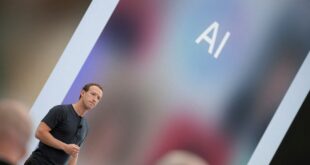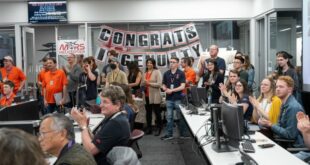Mar 29, 2024 12:00 PM
Here’s Proof the AI Boom Is Real: More People Are Tapping ChatGPT at Work

Ever since the rollout of ChatGPT in November 2022, many people in science, business, and media have been obsessed with AI. A cursory look at my own published work during that period fingers me as among the guilty. My defense is that I share with those other obsessives a belief that large language models are the leading edge of an epochal transformation. Maybe I’m swimming in generative Kool-Aid, but I believe AI advances within our grasp will change not only the way we work, but the structure of businesses, and ultimately the course of humanity.
Not everyone agrees, and in recent months there’s been a backlash. AI has been oversold and overhyped, some experts now opine. Self-styled AI-critic-in-chief Gary Marcus recently said of the LLM boom, “It wouldn’t surprise me if, to some extent, this whole thing fizzled out.” Others claim that AI is mired in the “trough of disillusionment.”
This week we got some data that won’t resolve the larger questions but provides a snapshot of how the US, if not the world, views the advent of AI and large language models. The Pew Research Center—which did similar probes during the rise of the internet, social media, and mobile devices—released a study of how ChatGPT was being used, regarded, and trusted. The sample was taken between February 7 and 11 of this year.
Some of the numbers at first seem to indicate that the LLM controversy might be a parochial disagreement that most people don’t care about. A third of Americans haven’t heard of ChatGPT. Just under a quarter have used it. Oh, and for all the panic about how AI is going to flood the public square with misinformation about the 2024 election? So far, only 2 percent of Americans have used ChatGPT to get information about the presidential election season already underway.
More broadly, though, data from the survey indicates that we’re seeing a powerful technology whose rise is just beginning. If you accept Pew’s sample as indicative of all Americans, millions of people are indeed familiar with ChatGPT. And one thing in particular stands out: While 17 percent of respondents said they have used it for entertainment and an identical number says they’ve tried it to learn something new, a full 20 percent of adults say that they have used ChatGPT for work. That’s up dramatically from the 12 percent who responded affirmatively when the same question was asked six months earlier—a rise of two-thirds.
When I spoke to Colleen McClain, a Pew research associate involved in the study, she agreed that it seems to track with other huge technological shifts. “If you look at our trend charts over time on internet access, smartphones, social media, certainly some of them show this uptick,” she says. For some technologies there had been a leveling off, she adds. But in the ones she mentioned, the plateau came only when so many people came on board that there weren’t many stragglers left.
What’s crazy about that sudden jump in ChatGPT business use from 12 percent to 20 percent is that we’re only at the beginning stages of humans collaborating with these models. And the tools to fully make use of ChatGPT are in a nascent status. That’s changing fast. OpenAI, ChatGPT’s creator, is going full tilt, and AI giants Microsoft and Google are still in the process of diverting their workforces to redesign every product line to integrate conversational AI. And startups like Sierra, which is building agents for corporate customers, are enabling bespoke usages that take advantage of multiple models. As this process continues, more people will use AI tools. And since the foundation models are getting exponentially better—am I hearing that GPT5 will show up this year?—that will make them even more compelling. This raises the possibility that the quality of virtually all work will reside in how well one can draw out the talents of a robot collaborator.
What past technology can help us understand the trajectory of the rocket ship we’re on? While the near limitless ceiling of AI makes it hard to find an analog, I suggest the uptake of spreadsheets. Dan Bricklin and Bob Frankston invented them in 1978, and a year later the concept was embodied in VisiCalc, which at the time ran only on Apple computers. Spreadsheets had a phenomenal and disruptive effect on the business world. More than mere accounting tools, they triggered an era of business innovation and shook up the flow of information inside companies. Yet it took a few years before the business world widely adopted spreadsheets. The turning point came with a new and more powerful product called Lotus 1, 2, 3, which ran on the IBM PC. The current and near-future startups in the AI world, like Sierra, are all hoping to become the Lotuses of our era—but also to be much more consequential and lasting. Spreadsheets are largely limited to the business domain. LLMs can seemingly mess with anything.
The Pew study indicates that the kind of acceleration we saw in spreadsheets and other things like smart mobile phones (which took years to become ubiquitous) might happen even more rapidly. Don’t be distracted by the numbers of people who haven’t heard of ChatGPT yet—the real bellwethers, particularly among well-educated or younger people, are in those business numbers. The recent leap in work use might indicate that those who are already augmenting their work with the brainy verbosity of LLMs are advocating it to colleagues. Also, the fact that a fifth of Americans have used AI for work, thereby potentially becoming more efficient, might indicate that whoever wins the White House in November will inherit an an economy that just got a turbo boost—and maybe a growing unemployment problem as companies find that LLMs can get work done with fewer workers.
At Pew, at least, AI isn’t throwing people out of work. Though the Pew researchers are clearly knowledgeable about the technology, McClain tells me that she wrote her summary of the results without the help of ChatGPT. “We do not use AI for writing things like-external facing products,” she said. I wonder if a survey a few years from now might get different results.

In 1984, five years after VisiCalc launched, I wrote a piece called “A Spreadsheet Way of Knowledge” for Harper's magazine that attempted to explain the phenomenon to an audience largely unaware of what a spreadsheet was and why it mattered. What will we be saying in 2027, five years after ChatGPT? This excerpt is from a reprint of my article in celebration of the spreadsheet’s 30th anniversary.
Today, VisiCalc and its newer rivals, most notably, a more powerful spreadsheet program designed by the Lotus Development Corporation called 1–2–3, are making fundamental changes in the way American businesses work. For the first time, businessmen have at their fingertips sophisticated and flexible means to chart all the variables—from interest rates to warehouse space—that make (and break) businesses. The biggest firms, the most diversified corporations, can be neatly translated into spreadsheet “models”—each box of the grid a window on to once-overlooked facts or relationships. These models can be used not only to keep track of transactions but also to analyze the nature of a business itself. They allow businessmen to calculate the effects of sudden changes in the corporate environment (a decrease in the prime rate) and to experiment with scenarios (anything from the expansion of a product line to a merger)—all with an ease inconceivable five years ago.
More than a million computer spreadsheet programs worth more than $250 million will be purchased in the United States this year. There are corporate executives, wholesalers, retailers, and small business owners who talk about their business lives in two time periods: before and after the electronic spreadsheet. They cite prodigious gains in productivity. They speak of having a better handle on their businesses, of knowing more and planning better, of approaching their work more imaginatively.
A virtual cult of the spreadsheet has formed, complete with gurus and initiates, detailed lore, arcane rituals – and an unshakable belief that the way the world works can be embodied in rows and columns of numbers and formulas.

Reardon asks, “Who did it better on Broadway: David Byrne or Bruce Springsteen?”
Oh, man, that is tough. Byrne’s “American Utopia” and the one-man show—with a cameo from his bride—“Springsteen on Broadway” were both spectacular in their own ways. I might be tempted to say that Byrne’s show, which rethought the conventions of a musical, even a jukebox one with familiar songs, did Broadway “better.” The entire performance unfolded like a complex and liberating symphony, with each song building on the previous ones. Byrne’s supporting cast not only danced and played instruments, but revealed charming personalities through music and movement. Byrne himself was electric. The experience cocooned the audience with joy.
Springsteen stayed within the bounds of a traditional Broadway one-hander, mixing his songs into a candid autobiographical narrative drawn from his book. But for his fans in particular there was something priceless in seeing The Boss in intimate quarters. Well, not exactly priceless—the ticket prices were astronomical. But I doubt anyone asked for refunds. At one point, Springsteen stepped in front of the microphones to the edge of the stage and sang a verse without amplification. For those seconds, we who have seen Springsteen as a dot at the other end in a crowded arena, or his image in big video screens, got the pure unfiltered real thing. Unforgettable.
You can submit questions tomail@wired.com. Write ASK LEVY in the subject line.

According to the research wing of the Swiss Re insurance giant, pretty much every year now is a catastrophic one in terms of natural disasters. And it’s going to get worse.

A data broker has exposed who visited Jeffrey Epstein’s Virgin Islands retreat. Pro tip: Next time you visit somewhere you might regret, consider leaving your mobile device at home.
Meet the guy whose charity gets the dough from billionaires who believe in effective altruism.
There are two versions of London mayor Sadiq Khan: a traditional liberal pol and, in the conspiracy-addled mind of rightist opponents, a deranged apostle of wokeness.
RIP Vernor Vinge, the sci-fi author whose novels affected the real-world outlook on cyberspace, crypto, and especially the singularity.

Will Knight
Steven Levy
Will Knight
Will Knight
Will Knight
Steven Levy
Kate Knibbs
Chris Stokel-Walker
*****
Credit belongs to : www.wired.com
 MaharlikaNews | Canada Leading Online Filipino Newspaper Portal The No. 1 most engaged information website for Filipino – Canadian in Canada. MaharlikaNews.com received almost a quarter a million visitors in 2020.
MaharlikaNews | Canada Leading Online Filipino Newspaper Portal The No. 1 most engaged information website for Filipino – Canadian in Canada. MaharlikaNews.com received almost a quarter a million visitors in 2020.
















